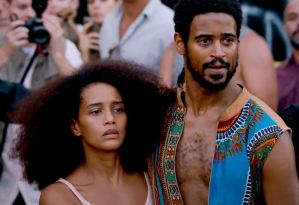By Lenore T. Adkins,
Special to the AFRO
The African Diaspora International Film Festival will celebrate its 30th anniversary in New York City in style — with its largest film festival ever.
The film festival, running November 25 through December 11, boasts 89 documentary and fiction films from 44 different countries on seven silver screens. Diarah N’daw-Spech, who is Afro French, founded the festival with her Afro-Cuban husband, Reinaldo Barroso Spech, to challenge stereotypes about Black people.
They do this by scouring film festivals, trade shows and submissions for socially relevant films that illuminate Black people’s richness, diversity, and human experience. The couple prefer films that aren’t commercially available and tell stories that are difficult to find elsewhere.
“We are really a festival of discovery,” N’daw-Spech said. “Thirty years ago, those films did not have a lot of visibility and now 30 years later, there’s still a lot of discovery.”
Over the course of 30 years, the festival has become even richer by including stories about other people of color, including indigenous stories from places like Samoa. The film festival started in New York City, and through the years, the couple added several other cities including Chicago, Paris, and Washington, D.C. for annual film festivals.
The couple widened the festival’s reach this year by partnering with various New York organizations to screen seven films across the city — for free. These community screenings boost access to people who didn’t know about the festival or wouldn’t have been able to attend otherwise. These partnerships mean screenings will commence at: Cinema Village, the Schomburg Center, the Baruch Performing Arts Center at Baruch College and the Boys & Girls Club of Harlem. Paid screenings will take place at Columbia University’s Teacher’s College, Thalia Village and Cinema Village.
Prices per movie range from free to $30, depending on the screening or event. This festival marks the first one the couple has held since the pandemic that will be in person, without an online component.
“It’s really something different when people are together, when there’s an exchange of ideas,” N’daw-Spech said of the decision to hold the festival in person.
Masks are recommended at all venues. Proof of vaccination will be required at Columbia University’s Teacher’s College and Baruch College.
The 44 countries represented include: Algeria, Cuba, Germany, Guadeloupe, France, New Zealand, South Africa, Peru, Senegal, the United Kingdom, and Zambia.
But if you can’t make it to the film festival for all of its 17 days, here are six films N’daw-Spech says you shouldn’t miss.
As far as I can walk (2021) is a fictional story about a young couple from Ghana who flee to Serbia in search of a better life. While he adjusts to life there, learns the language and becomes a successful soccer player, she opts to leave the country and try her luck elsewhere, leaving him to decide whether to continue his success or chase after her. The film earned the top prize at the Karlovy Vary International Film Festival, as well as dozens of awards elsewhere. N’daw-Spech said, calling it an interesting and provocative work. “It’s really timely as well because it deals with the issue of immigration,” she said. “It shows the story of people who are refugees from their perspective.”
Set in 1962 in Mali soon after the country earns its independence from France, Dancing the Twist in Bamako (2021) is a fictional story following a woman stuck in an arranged marriage who falls in love with a socialist. This happens against the backdrop of rock and roll music from the West wafting into Mali’s capital city and encouraging the youth learn the twist. “The story of this young man who is so enthusiastic because Mali just got independence and so he believes in the revolution and the society that’s going to be open for all and where there’s going to be progress,” she said. “(But) everything unravels, both the revolution and the love story.”
In Executive Order (2022), an authoritarian government in a dystopian, future Brazil signs an executive order that sends all citizens of African descent to Africa to repay debts from slavery. But the order creates chaos, protests, and launches an underground resistance that spreads all over the country. The movie is a literal representation of the phrase, “Go back to Africa,” a common, racist phrase non-Blacks level at Black people, regardless of where they’re born, to suggest Black people don’t belong in a particular country. “This time they mean it actually,” N’daw-Spech said of the fictional government. “Can you imagine you have three generations who don’t know the language and they want to ship you away? That’s really crazy.”
Get Out Alive (2021) is an autobiographical musical about depression from Nikki Lynette, a Chicago artist and activist. In it, the multi-talented performer raises awareness about depression in Black women and how to survive it. “She uses her art to show how she went through depression and came out of it, so it’s also very inspirational,” N’daw-Spech says.
Byron Hurt, the filmmaker behind the documentary Hazing (2022), investigates the dangerous practice on American college campuses by interviewing the loved ones of people who died from and survived hazing. It dives into the psychological impact of people who haze and those who are being hazed, why the tradition still persists and how racism can infiltrate the process. “Some folks are not happy he made that film because (Hurt’s) putting it out for everyone to see, some things that are sacred,” N’daw-Spech said.
The Woodstock of House (2021) is a documentary about the birth of House music on the South Side of Chicago and how it morphed from disco music that, by the 1970s, mainstream America had demonized for being too Black, too Latin, and too gay. Several Chicago-based DJs created and popularized the genre now known as House music The film also highlights the annual Chosen Few Picnic & Festival. The House music festival takes place in July and draws more than 40,000 House heads to Jackson Park on Chicago’s South Side. “It’s very informative, very entertaining,” N’daw-Spech said of the film.
Help us Continue to tell OUR Story and join the AFRO family as a member –subscribers are now members! Join here!
The post New York Film Festival that Centers the Black Experience turns 30 appeared first on AFRO American Newspapers .











